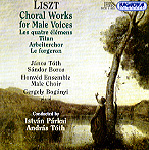These works for male chorus are far from first-rate Liszt; and they receive virtually no help from the ferocious-mannered, out-of-tune singing of the very enthusiastic men of the Honvéd Ensemble Male Chorus. The Les quatre èlèmens, a cycle of four settings of poems by Joseph Autran, began as one movement written in the 1840s as an occasional piece for the Trotebas choral society. The original piano accompaniment was later expanded into one for orchestra when the other three movements were added. Although the piano version is performed here, it sounds as if this lead-handed accompanist is trying to fill the sonic space of an entire studio-full of orchestral players, and the result is a rude and persistent pounding that only seems to make the singers sing louder and even more forcefully. The other three works on the program are exactly the same in character (thick-textures, rich harmonies, dramatic gestures) and in the way they are performed. Amid the heavy fire are some beautiful moments of welcome tranquility, and here the choir reveals an ability to sing warmly and expressively. There’s not much here to recommend–Liszt completists perhaps will want this–and even the sound is dense and edgy, leading to relatively quick auditory fatigue.
































